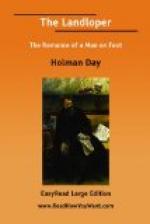He lowered his voice. “Thirty year I have work here. I live way up in the little room. Bread I eat with lard on it. It costs little. Of the six dollaire I save much. Ah, oui! Hist! Not for me I save it. Ah, non! To the priest I give it. To the good priest. And the poor childs what are sick—he send ’em to the farm—to have some outdoors. But I don’t sleep the night because I think the dollaire come so slow—and so many poor childs are sick.”
He picked up his rake and pike and went back to his labor.
The man under the tree did not lose his smile.
“Yonder is a brand of altruism that cannot be hypnotized or modified like Knight Chick’s, I fear,” he muttered. “You’d have to hit it on the head—kill it with sticks! And my definition of philanthropy has always been, ’giving away something you don’t want in order to get yourself advertised.’ Etienne is interesting. He is the only philanthropist I have even found who will eat lard instead of butter so as to save more for his philanthropy.” Now his smile grew hard. “Don’t dare to open your eyes, Altruism,” he commanded. “I saw the lids quiver a minute ago while that old man was talking, but remember you’re hypnotized.”
He saw the rack-tender lay down his pike so as to give both hands to his big rake.
He was pulling at something heavier than the ordinary flotsam—something far below the surface of the water. At last it broke through the black surface of the turbid flood. To Walker Farr, glancing carelessly, it seemed like a bedraggled bundle of rags with something white at the end.
“You come help, m’sieu’,” called old Etienne. “It is a dead woman.”
Together they pulled the rake’s dread burden slowly up the bars of the rack.
“You seem pretty cool about this,” gasped the young man.
“It is no new thing. Many drown themselves—they drown in the canal so they will be found. Women and girls, they drown themselves. So! Help me carry her.”
Farr gazed down on her after she had been laid on the canal bank. She was young, but thin and work-worn.
“Weaver,” commented old Etienne, laying back on her breast one of the hands he had lifted. “There’s the marks on the fingers where she have tie so many knots so quick.”
There was a key on her breast; it was secured by a cord that passed out of sight between the buttons on her waist. Farr stooped and pulled on the key. A folded paper came with the key; the other end of the cord was tied around the paper.
“You must not—it is for the coroner,” protested Etienne. “I know the law—I have drag up so many.”
“My besetting sin is curiosity,” declared the young man, his calm impertinence unruffled. He pulled the wet paper from the noose of the cord. “We’ll read this together.”
“I cannot read,” confessed the rack-tender. “You shall read it to me.” His little black eyes gleamed now with curiosity of his own. “I shall be glad to hear. The coroner he never read to me.”




